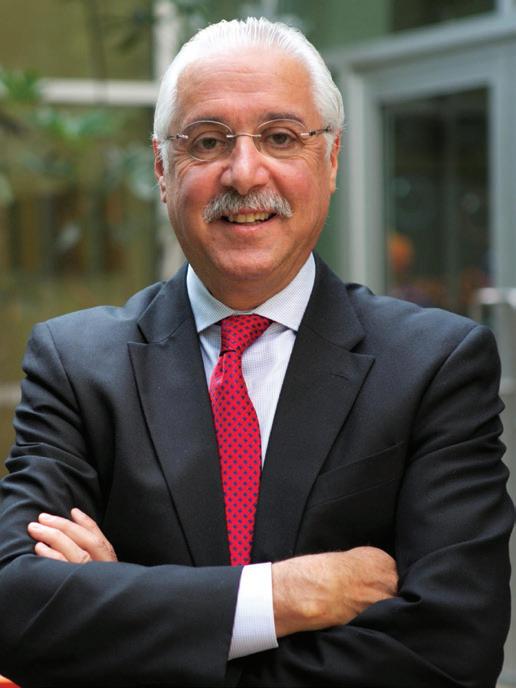
3 minute read
Hispanic Time
By DOREEN HEMLOCK/ Miami
GROWING PROGRAMS AND OUTREACH AT ALBIZU UNIVERSITY IN DORAL
Advertisement
There’s a new leader at Albizu University in Doral, and he’s raising the profile of the school that mainly serves Hispanic adults studying psychology and counseling. Dr. Alex Parnia, who already has led several U.S. colleges, took charge on Oct. 1 as interim chancellor in Florida at what’s billed as the only U.S. university named for a Hispanic. Among his goals: Expanding outreach by the school’s counseling clinic to help more community members in need.
Here’s an edited version of our talk with Parnia, who relocated from California and works closely with Albizu’s main campus in Puerto Rico. He is enjoying the diversity of nationalities in South Florida.
Hispanic Time: Tell us a little about Albizu University in Doral and what makes it different.
Alex Parnia: Albizu is primarily focused on working adults, who want to earn a degree to advance their careers and their lives. Our classes are held in the evenings, some on weekends and some online, which is all part of accommodating the working adult population.
We have close to 1,000 students, with 80-85 percent Hispanic. Our largest program is the Master of Science, offered for careers in psychology, counseling, mental health, and industrial organization. We also have undergraduate and doctoral programs and an MBA in healthcare administration. Diversity is part of our DNA. Dr. Carlos Albizu started the school in Puerto Rico in 1966 to infuse cultural sensitivity into the psychology curriculum. The Miami campus opened in 1980. Most of the faculty are bilingual [mainly in English and Spanish], so that helps diverse students feel more comfortable. Costs vary by program but are about $650 per credit for a graduate program and about $1,000 per credit for a doctoral. A 36-credit MBA would cost approximately $31.000. range of 8-10 percent a year. One reason is more adults are going back to school. Also, mental health has become important for everybody. Before COVID, I think there was still some stigma in talking about mental health. But once COVID hit and anxiety affected families from the 3-year-olds to the elderly, we see more demand for mental health services. In terms of facilities, the school opened an annex facing 25 th Ave. back in April. That building gives us better visibility for our admissions office on that high-traffic street.
HT: Why did you come to Albizu, and what’s your personal background?
AP: In my 38 years in higher education – I was in the Boston area for 29 years and in California for nearly 10 years, I’ve spent a lot of time in education for working adults. Most recently, I was consulting with universities and colleges in marketing, recruitment, and how to become more adultfriendly. So, when I saw this position at Albizu, I applied. I’ll help transition the school to the next permanent chancellor. More personally, I’m from Iran. I came to the United States in 1976, did a master’s, and then, did my doctorate at Claremont Graduate University in California.
HT: What are your plans as interim chancellor?
AP: First, I want to publicize that Albizu is here to help adults considering a career in psychology and mental health. Also, we have a counseling clinic that provides services to the community, and I’d like to see if we can do fundraising to help the underserved who might not be able to gain access to mental health services. We could possibly apply for government grants to extend our clinical services. I see great potential for Albizu to continue our growth and make a bigger impact in preparing mental health professionals.
HT: Does it matter that Albizu has been called the only university in the US with a Hispanic name?
AP: With the diversity here in Miami, it’s a benefit for us. The name prompts a good conversation about Dr. Albizu, who went to Purdue University, came back to Puerto Rico, wanted to infuse culture into existing programs in psychology, and was rebuffed, so he started this institution. Diversity is woven into all aspects of Albizu, from instruction to daily life, not brought in later but at our core from the start.
Dr. Alex Parnia is the new leader at Albizu University in Doral. HT: I understand the university is expanding. How so, and why? AP: Recently, we’ve been growing [the student population] in the










